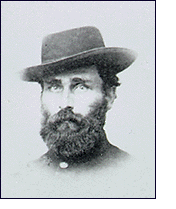|
|
|
| ||
|
The Densmores Import a Contraband
Benjamin was stationed among black troops and their families in Kentucky. Daniel worked at Union headquarters of the Bureau of Colored Troops in St. Louis. Somehow, they fixed on a scheme to send "contrabands" back to their home town of Red Wing as domestic servants. Ben Densmore wrote to his father about finding "a pair of Africans" for the Hastings family of Red Wing. The Smith family also wanted a "contraband." Benjamin and Daniel kept a lookout for likely candidates. Benjamin's work recruiting freed blacks into the Third Regiment U.S. Colored Heavy Artillery offered an excellent vantage point. . . . I will endeavor to make the best selection possible. At present I have in view to offer the opportunity to one of our colored soldiers wives - it will be difficult to find a "man and wife" of the right sort, and willing to go at the same time.1The Densmores debated whether to find help for their own households. Ben was gloomy. The distance [from Tennessee to Minnesota] is very great and the nooks and crannies by the way are serious obstacles to sending them through. And then they are not the most reliable people in the world after all - they are apt to be trifling - a girl of 14 years or so of the right stripe would, I believe, please the best.2In March, 1864, Orrin Densmore Sr. wrote to Daniel that Mr. Hastings still wanted a couple - a man for the barn and his wife for the kitchen. In addition to Mrs. Smith, a "Mrs. Dr. Jones" would also take "a woman if good." They all wanted to know about wages and transportation costs. Orrin warned the boys that their mother, Elizabeth, was doubtful.
We talked the "Shady question" over and the fear of getting an unsuitable or unsuited customer on our hands induced your mother to think unfavorably of the project. Since which conversation with others induces a disposition to try one if you can find one you think suitable - a single woman, tidy and honest, accustomed to house work. Orrin also noted the advantage of several Red Wing families to places their orders all at once. That way, relocated blacks would be more content in the strange and snowy new surroundings with a few others of their race in town.3 One of the sisters, Martha Densmore, liked the idea. Martha wrote that the family was so busy helping feed Union troops that passed through town, they desperately needed domestic support. Martha hoped for a "darkey woman" who was "neat, honest and active." She urged her brothers to hurry. Daniel apparently took over the search. From his more cosmopolitan position in St. Louis, he wrote to Benjamin: Am arranging as fast as may be to get the servant started for the folks at home. Could get one any day, but I want one especially recommended.4Their mother, Elizabeth, remained apprehensive. By late April, 1864, she had hired a local Swedish woman to help around the house. But the servant worried that she and the black import would both be identified as "help" - and therefore as equals. She also fretted that she would be "set aside for the ebony article." Orrin still wanted to try. He urged his son to point a black woman towards the North Star.5 Daniel was tied to his desk in St. Louis. He asked white officers commanding troops in the field to help him. The first recruiting mission failed. My friend slipped up, by the [slave's] owner running the wench out of the county the night before [my friend] was to set out with her for the city. But he [said he] had another selection and if he did not find the first one again - which he wished to do just out of spite, and because her owner threatened to whip her - would ship her soon, from Hannibal. I answer him - ship!6 The need at home grew worse. The worried Swede quit in July, 1864. She could make more money at fieldwork than scrubbing floors. Then, on the night of Tuesday, August 16, Mary Prist arrived. Orrin wrote that the contraband slave was "disappointed that so few colored people are here." In addition, Mary Prist expected $2 a week while the Densmores wanted to pay just $1.50. An agreement of some sort must have been reached.7 By month's end, Orrin wrote: Our contraband is doing well and seems contented to stay. She is the first one up. Milks two cows . . . will harness the horse if desired - catches him if pasturing in Pettibone's lot and, with halter only, rides him to the barn. She may prove coarse but fully meets our expectation and we hope will meet our wants.8Benjamin and Daniel Densmore served in the Union army for two more years. It's unclear how many more black domestics they recruited for the households of Red Wing. Probably not many. Nor is it entirely clear how long Mary Prist worked and lived in Orrin Densmore's home. At the time she arrived, Mary was one of about 300 blacks in Minnesota. The census of 1865 shows a "colored" woman named Mary McElroy living in the household. Perhaps, like former slaves across America, she shed a master's name for one of her own choosing. Perhaps she married. By 1870, Mary was gone - replaced in the census by Matilda Peterson, a domestic servant born not in the South, but in Sweden.9
| ||||

